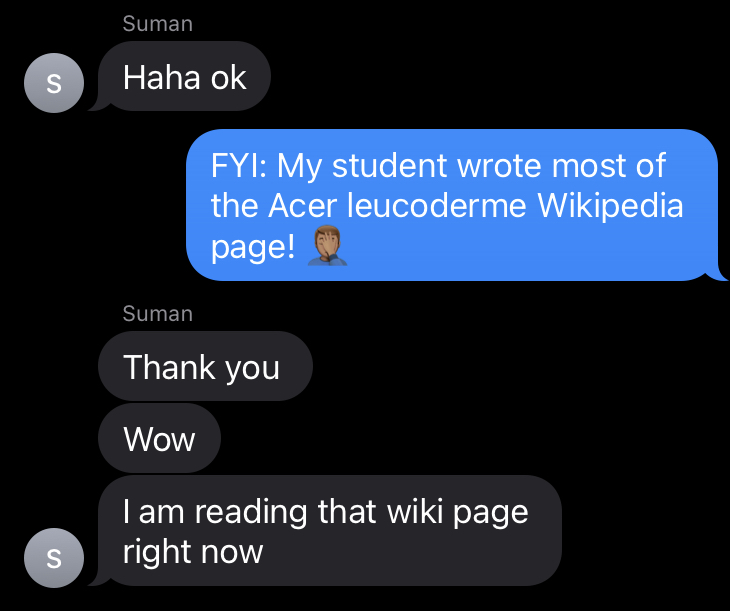Jay. F Bolin is an Associate Professor and Chair of the Biology Department at Catawba College, Salisbury, North Carolina.

As a college professor I’m fortunate to teach subjects I love at Catawba College and teaching with Wiki Education I can confidently say has made my teaching even more satisfying. Since 2016, I’ve used Wiki Education in three Plant Taxonomy courses (one that I’m offering this fall) and one Dendrology Course (for those not into esoteric -ologies, that’s a course on the biology of trees). I’ll admit I was not a Wikipedia editor before learning about Wiki Education at a scientific conference and still haven’t been fully transformed into a late night Wikipedian. But, I do dabble on occasion, since I’ve been learning about editing Wikipedia right along with my students.
In my courses where I employ Wiki Education the implementation is incredibly straightforward, I have students find stubs (sad nubbins of Wikipedia pages) for native plants in my home state of North Carolina. With over 4,000 plants in the Tar Heel state, the student’s task of finding a stub for a plant that is interesting to them and developing a reasonable Wikipedia species page is a challenging but still reasonable ask. They explore and write succinct and dispassionate descriptions in Wikipedia of the plants themselves, their ecology, taxonomy, and any other area that the students choose with adequate references. I love the self-directed aspect of Wiki Education assignments; for example, if a student is interested in Native American uses of a plant they follow that path, if they are biochemistry nuts they can describe medicinally active compounds.
 Mince no words, implementing Wiki Education in your classroom is work, but it is rewarding for so many reasons. Just this week, I was on a nerdy iMessage thread with two other academic botanists about the identification of a particular maple tree in Kentucky. We were discussing possible options then when I intuited that he was reading from a Wikipedia page that my student primarily authored! There aren’t a lot of student assignments that you work on with your student and spend time carefully editing that make an impact like Wiki Education outside of the classroom. Just so you know, the popular “facepalm” emoticon on the right is more of a mind-blown happy thing than the traditional usage.
Mince no words, implementing Wiki Education in your classroom is work, but it is rewarding for so many reasons. Just this week, I was on a nerdy iMessage thread with two other academic botanists about the identification of a particular maple tree in Kentucky. We were discussing possible options then when I intuited that he was reading from a Wikipedia page that my student primarily authored! There aren’t a lot of student assignments that you work on with your student and spend time carefully editing that make an impact like Wiki Education outside of the classroom. Just so you know, the popular “facepalm” emoticon on the right is more of a mind-blown happy thing than the traditional usage.
Another “Ah-Ha” or Wow teaching moment that I had a few years ago was in a Plant Taxonomy Class. While students were doing some revisions and research on their own Wikipedia plant species pages in class, a student just yelled out “NOOOOOO, NOOOOOOOO” and gesticulated wildly, alarmed I walked over and asked what the issue was. He shook his head and showed me his phone. He had the astute idea of doing more research on his focal plant species using a very widely used photo identification phone app called iNaturalist. When he pulled up the description of the plant species in iNaturalist, what he saw was his own writing, talk about circular: He had written nearly all of the Wikipedia page, already made it “live” and was looking for guidance from his own writing. As many natural historians know Wikipedia is an invaluable source of freely available taxonomic information, iNaturalist (funded by the California Academy of Science and National Geographic) and the Encyclopedia of Life (funded by the Smithsonian Institution) both feed some or all of their descriptive data from Wikipedia. Soon all the students whipped out their phones (OK I’m lying they were already out on the lab tables), and looked up their focal Wiki Education species on the iNaturalist app, and were one by one blown away and shaken, that the inviolable fount of knowledge, their phones, were linking their own writing, for class! After that they realized that they were the experts and took their tasks of editing and researching “their plant pages” with solemn seriousness.
A few protips from a somewhat seasoned Wiki Education professor (78.K words & 926 references added by students and an astounding 611k plant species page views! (this is how Wikipedians talk)): If you aren’t using Wiki Education in the classroom I suggest giving it a whirl, as long as 1) your class is relatively small, 2) your students are mostly Junior or Seniors, and 3) you have time (I know) to edit your student’s short Wikipedia entries. As a final thought, if you are preparing a new course, that would be a good time to introduce a Wiki Education assignment. Mashing the well thought out Wiki Education training and modules into an existing course may not work unless you can take a paring knife to the precious content you have developed for a course that you’ve taught a few times. I enjoy teaching with Wiki Education and I think you will too.
Image credit: Kharris0317, CC BY-SA 4.0, via Wikimedia Commons

This is awesome! Hope you and the family are well!